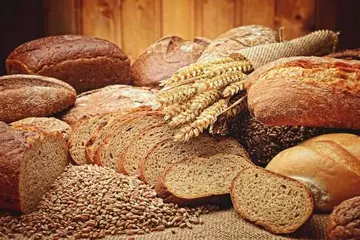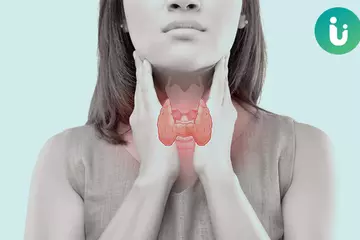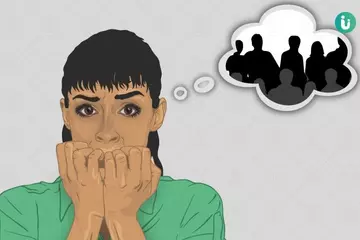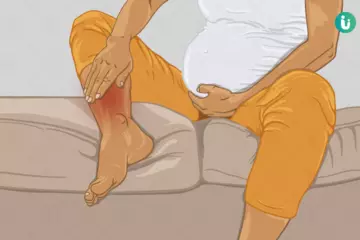Why does chest pain happen?
The chest area has many structures such as the lungs, heart, pancreas, stomach, gallbladder, ribs, muscles, nerves, etc. Hence, a chest pain may be experienced if there is an underlying condition, damage, injury, infection, tumour, or abnormality in any of the above-mentioned organs.
Heart Problems
Angina is a term used to define a pain characterized by a feeling of pressure or squeezing which occurs in the chest due to an underlying heart problem. Angina and heart attack are two different things. Angina is a warning sign of a heart disease, however, heart attack (myocardial infarction) is a serious disease which can also be fatal if emergency treatment is not given.
-
Inflammation
In inflammation, a part or organ of the body swells up due to the accumulation of fluid, immune system cells, or foreign body toxins. Inflammation can occur in the sac which surrounds the heart. This is known as pericarditis. It results in a sharp pain in the chest which may spread to your neck or shoulder muscles.
-
Infection
In some people, infectious bacteria can reach the heart muscles and cause infection. One of such conditions is known is acute bacterial endocarditis. This causes pain in the chest when you breathe, sneeze or cough.
-
Blockage
When the level of your blood cholesterol is high, it can get accumulated on the walls of one of the arteries which supply blood to the heart (coronary artery). Over a period of time, this plaque can lead to blockage of your coronary artery. This is known as coronary artery disease. In this disease, chest pain occurs because the availability of oxygen to your heart muscles is reduced and in return, the heart has to work harder which causes pain. The pain causes a tightening or pressure sensation in your chest. The pain may also radiate to your neck, jaw, shoulder, or arm. (Read more: High cholesterol)
-
Heart muscle damage
When the heart muscles do not receive enough oxygen, it leads to heart muscle damage. When this happens, a pain similar to that of angina is experienced in the centre or on the left side of the chest. Although, this pain is severe than that in angina and is the crushing type.
-
Genetic disorder
In some genetic disorders, the muscle in one part of the heart may become excessively thick. This causes pain in the chest which may also be associated with breathlessness after exercise or intense physical activity. If the muscle keeps thickening over a period of time, it will make the heart work harder to pump blood. As a result, in later stages, you may also experience dizziness, fatigue, fainting, etc. In severe cases, heart failure can also occur.
-
Malfunction of the heart structures
Sometimes, one or more structures of the heart may not work properly. For example, our heart has valves between the upper and lower chambers as well in the major blood vessels which take blood to and away from the heart. These valves prevent backflow of the blood and make sure that it flows in one direction. If a valve is malfunctioned, such as in mitral valve prolapse, it does not close completely, there won’t be enough pressure generated in the heart chamber to pump the blood. If the prolapse is mild, the disease may not show any symptoms. In moderate to severe cases, the person experiences chest pain which is also associated with other symptoms such as palpitations, dizziness, etc.
-
Tear of an artery
In a few instances, the wall of an artery of the heart (coronary artery) may tear. This is known as coronary artery dissection. If the aorta (a major blood vessel which carries blood from the heart to be supplied to the rest of the body), it is called an aortic dissection. This leads to filling up of the blood in the chest cavity. This leaking blood accumulates and causes sudden and severe pain in the chest along with a tearing sensation which may be felt in the neck, back or abdomen (the area between the ribs and pelvis).
Lung Problems
-
Inflammation
A layer of tissue which covers our lungs is known as the pleura. Any irritation in the pleura may result in its inflammation which is known as pleuritis. The pleuritic pain is characterized by a sharp pain in the chest which occurs while breathing, coughing or sneezing.
-
Infection
Sometimes, our lungs may get infected with bacteria or viruses. In such conditions, you may experience chest pain which is similar to that of pleuritis and occurs while sneezing, coughing or breathing. In pneumonia, the chest pain is dull, aching type which is associated with other symptoms such as fever, cough, chills, etc. Sometimes, pus may also come with the mucus while coughing.
-
Blood clot or blockage
A blood clot can travel from the bloodstream to your lungs and get itself lodged in there. This clot may result in the development of an acute, sharp pain as seen in pleuritis. It may also cause fever, and in severe cases, the person may go in a state of shock (a life-threatening situation in which enough oxygen doesn’t reach the body and may damage various organs). The blood clot most commonly occurs after a major surgery such as a surgery to remove a tumour or a blood clot or coagulation (thrombosis) in a deep vein.
-
High blood pressure
The right side of the heart receives blood from the lungs. Hence, high blood pressure in the arteries of the lungs increases the workload on the right side of the heart. This is known as pulmonary hyperventilation. The chest pain experienced in this condition is similar to that of angina.
-
Disease or allergy
You may also experience chest pain if you have a disease or an allergy in the airway system such as asthma. The pain is often associated with symptoms like wheezing, shortness of breath, and discomfort while breathing.
Problems of the Digestive system
-
Ulcers
Ulcers or sores in the lining of the stomach are known as peptic ulcers. You may experience pain and discomfort in the chest area because of them. The pain is often severe and burning type.
-
Gastroesophageal reflux disease
When the contents of your stomach start flowing back into your food pipe, it is known as gastroesophageal reflux disease (GERD). The stomach acid causes a burning pain or heartburn in the lower central region of your chest.
-
A problem in the muscles of the oesophagus
When the muscles of your oesophagus do not contract in a synchronized manner or contract too much, it causes pain in the centre of your chest. The pain is usually felt while eating food when it travels down your throat.
-
Inflammation
If your pancreas or gallbladder have inflammation, it can cause chest pain too. Pain associated with the pancreas is felt on the left side, while that of the gallbladder is experienced on the right side. It may also be felt in the centre of the chest and may also radiate to other areas of the body. The pain is sharp and severe in nature. Pancreatic pain is often relieved on bending forward.
-
Hypersensitivity
Sometimes, your oesophagus may become painful on the slightest of changes in pressure or acidic contents. This is known as oesophagal hypersensitivity.
-
Rupture of oesophagus
In severe cases of vomiting or after undergoing a surgery, your oesophagus might rupture. It causes a sudden and sharp pain in the chest.
-
Hernia
A hiatal hernia is a term which used to describe the condition in which your stomach pushes itself into the lower chest region after eating food. Because of this, you may experience fullness, pain, and discomfort in the chest.
-
Epiglottitis
It is an emergency condition which may obstruct the airway or your baby. The symptoms include shortness of breath, high fever, chest pain, extremely sore throat which may also cause difficulty in swallowing.,
Musculoskeletal Problems
Chest pain may also be felt if you get a muscle sprain or fracture in your ribs. This type of pain is sharp, severe and is felt in the area of the injury.
Costochondritis is one such condition which occurs in babies when the tissue which connects the ribs is inflamed and causes severe chest pain. It may also be associated with a dry cough.
Nerve problems
Conditions in which injury or infection of the nerves which are associated with the chest area occurs such as trauma to the spine, shingles, etc, chest pain is common. In shingles, an infection by varicella-zoster virus occurs along the nerve. This may cause severe pain in the chest, shoulder, and back area. It is often associated with the development of a rash in the area where the nerve lies.
Risk factors
following are a few factors which make you more prone to chest pain:
- Smoking.
- Excessive alcohol intake.
- Obesity (overweight)
- Immune system disorders which make you prone to infections.
- High cholesterol in the blood serum increases the risk of coronary artery blockage.
- High blood pressure increases the workload on our heart.
- Minimum to no physical activity has a negative effect on your heart and your body as a whole.
- Eating unhealthy and junk food increases the risk of developing heart and digestive system related problems.
(Get online doctor consultation for any health issue)



 Doctors for Chest Pain
Doctors for Chest Pain  OTC Medicines for Chest Pain
OTC Medicines for Chest Pain
 Lab tests for Chest Pain
Lab tests for Chest Pain Chest Pain articles
Chest Pain articles
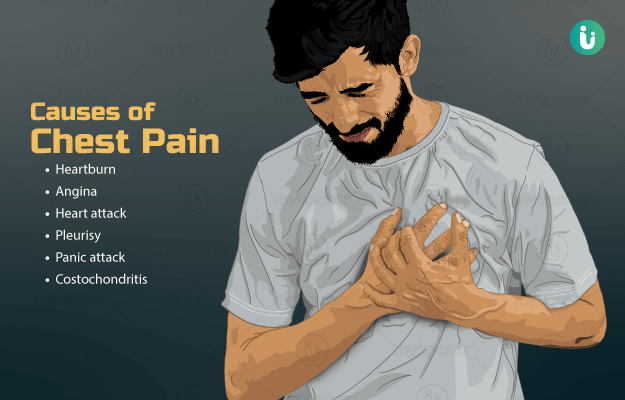
 Ayurvedic Treatment of Chest Pain
Ayurvedic Treatment of Chest Pain
 Homeopathic Treatment of Chest Pain
Homeopathic Treatment of Chest Pain

































 Editorial Team
Editorial Team
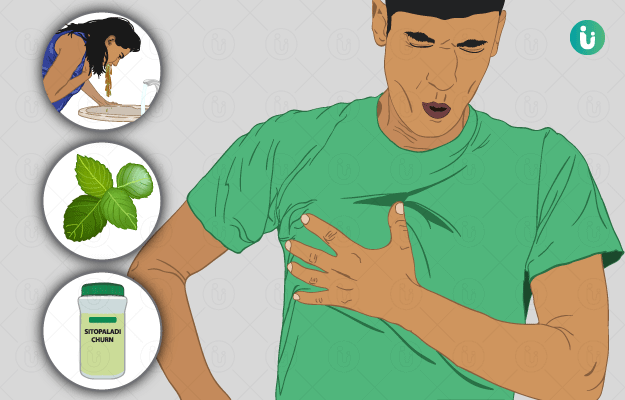
 Dr. Laxmidutta Shukla
Dr. Laxmidutta Shukla
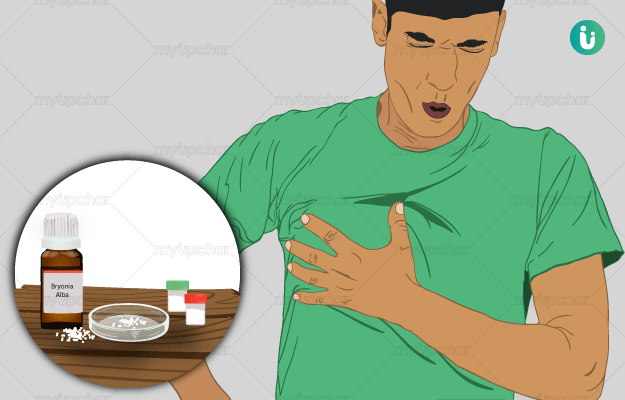
 Dr. Rachita Narsaria
Dr. Rachita Narsaria

